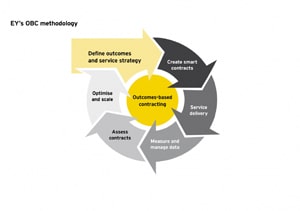
 Healthcare systems around the world are fast reaching, or already at, breaking point and struggling to balance the multitude of demands on their limited resources. Historically, healthcare has been paid for based on volume rather than value and outcomes. Outcomes-based contracting (OBC) offers a different approach to tackling these challenges by commissioning healthcare based on results delivered and tying payment to the achievement of specific performance standards. It is increasingly seen as a viable, and perhaps the only sustainable, way of aligning payment to value. This in turn incentivises and enables greater efficiency and effectiveness across the system.
Healthcare systems around the world are fast reaching, or already at, breaking point and struggling to balance the multitude of demands on their limited resources. Historically, healthcare has been paid for based on volume rather than value and outcomes. Outcomes-based contracting (OBC) offers a different approach to tackling these challenges by commissioning healthcare based on results delivered and tying payment to the achievement of specific performance standards. It is increasingly seen as a viable, and perhaps the only sustainable, way of aligning payment to value. This in turn incentivises and enables greater efficiency and effectiveness across the system.
OBC not only delivers a better patient experience and results, but also provides a clear link between price and treatment effectiveness and incentivises manufacturers to play a broader role in healthcare. There are also significant benefits for life science companies, including fundamentally changing the relationships with your customers, shifting the conversation from price to value and even creating opportunities for new revenue streams.
The historic barriers are quickly disappearing
There have been many historic barriers to OBC, but today’s leaders are finding ways to overcome them to leverage the significant opportunity that exists:
1. Barrier: ‘We can’t agree on the right outcomes let alone influence them.’ Approach:
- Target the more innovative, forward-thinking customers based on their willingness and need to engage and build trusted relationships based on a shared vision, transparency and early collaboration to ensure alignment and buy-in.
- Have a clear service strategy to influence and ‘de-risk’ outcomes, leveraging existing solutions where possible.
2. Barrier: ‘We can’t capture the data to measure outcomes robustly.’ Approach:
- Leverage data platforms and exploit new technologies and the digitalisation of health data to make it easier and safer to capture data.
- Regulators and providers are increasingly driving policy change to allow key stakeholders to get access to data for the benefit of all.
3. Barrier: ‘It’s just too risky for us.’ Approach:
- Consider using safeguards (such as spending caps or rebates) to help with budget certainty, minimise the risk for payers and help ensure the right behaviours from both sides are being incentivised.
- Opt for evolution not revolution and a more pragmatic and gradual approach to help both sides better understand risk exposure and get comfortable.
How to progress while managing risk
 Successfully delivering OBC requires a robust and agile methodology, with six recommended steps (see figure) supported by new capabilities. Done correctly this should allow you to progress in a way that does not require unacceptable levels of risk, huge investments or ‘big bets’.
Successfully delivering OBC requires a robust and agile methodology, with six recommended steps (see figure) supported by new capabilities. Done correctly this should allow you to progress in a way that does not require unacceptable levels of risk, huge investments or ‘big bets’.
Underpinning these critical steps is EY’s Health Outcome Exchange (HOX). The aim of the HOX is to streamline data collection, management and analytics required to support OBC. It provides a transparent, end-to-end, scalable and secure industry platform to allow all parties to understand and analyse contract performance and ensure that each party gets value for money.
Getting started
While many have been experimenting with OBC, to date few have managed to scale and exploit its full potential, which represents a huge opportunity. To get started there are some critical ‘get rights’:
- Strong leadership commitment: OBC has the potential to be a strategic imperative for your business as well as influence your long-term success. However, winning in this new world requires investment in new capabilities and the vision and conviction to fundamentally transform how you operate while balancing shorter-term priorities.
- Changing your perspective of risk: By its very nature, OBCs can seem risky but it is essential to avoid creating contracts with no downside risk. This can destroy trust and may go against what you are trying to achieve. A meaningful and appropriate amount of risk and reward needs to be built in.
- Services are essential: Services play an important role in helping to deliver the best outcomes for patients. They create a more controlled environment in which to target other issues in the pathway and, in turn, help to de-risk the outcomes contracts. In addition to this, OBC provides the opportunity to challenge and rationalise your broader service strategy to ensure your services are only focused on the outcomes that matter and improve return on investment.
- Customer-centric co-creation: Work with forward-thinking customers who are equally committed to making this work and avoid second-guessing what your customers need and thinking in a purely product-centric way.
- Adopt industry solutions: Ease of implementation for healthcare providers is a critical success factor which requires a standard, cross-company approach. The aim of the HOX is to simplify things by operating on a standard, open industry infrastructure.
- Invest in building new capabilities: Life science companies need to build new capabilities now and not wait until it is too late to be able to respond.
- Experiment to test and learn: It is best for both sides to experiment and learn before jumping into a full-fledged contractual agreement that both parties may perceive as risky.
For those who think OBC will play a significant role in how life science companies are reimbursed in the future, there has never been a better time to pursue OBC. The time is now for life science companies to truly change the game for the industry and to prepare to be judged on the outcomes they deliver.
EY is a global leader in assurance, tax, transaction and advisory services. For more information on how our Global Life Sciences Team of nearly 17,000 sector-focused professionals is helping clients make a real difference to their patients, customers and employees, visit ey.com/vitalsigns
The views reflected in this article are the views of the authors and do not necessarily reflect the views of the global EY organisation or its member firms.
Aaron Bean and Alice Blezat, Life Sciences, EY UK & Ireland





